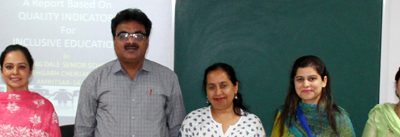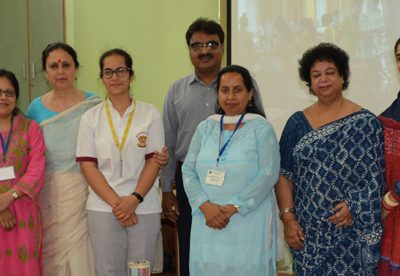The IES is a service designed to offer support and expertise to the inclusive schools by organization of programs and adapted teaching to students with special needs in an inclusive setting. IES will be managed through the office bearers of Global Inclusive Education Network.
- The Course on INCLUSIVE TEACHING AND LEARNING – A Professional Capacity Building Programme
The conferences organized across India guided the organisers to develop required courses separately for in-service teachers, parents, non-teaching staff, para-medical staff, transport staff, peons etc. based on learning outcomes of the conferences.
Principals, Special Educators, Subject Teachers and other stakeholders to develop the proposed course on Inclusive Teaching and Learning will be involved.
The different modules of the proposed course will be as per the Central and State Boards, the RPD Act and the RTE Act and implementation guidelines from time to time and on the prescribed guidelines of National Council of Teacher Education (NCTE).
- Support to School Boards and Schools
This support is primarily for the organization of adapted services, the professional and technical means for adapting these services, the use of the best strategies to ensure the help required for the success of students, the assistance for the drawing-up and carrying out of IEPs, the quality of relations with parents, etc. These support measures are undertaken with the intent to create a support network that will promote an ongoing exchange between various partners.
- Continuous Professional Development
The intent of continuous professional development is to offer training that focuses on developing the capacity of school personnel to offer adapted services to students with special needs. The intended outcome is for schools to have a level of expertise and autonomy enabling them to deliver quality services to students with disabilities or with learning adaptation difficulties.
- Research and Development Activities
Research and development activities (R&D A) aim to develop a body of knowledge and to advance research in this field. These objectives will be attained through the design and the carrying out of specific projects.
- Developing Practitioners as Researchers and Authors
The SIED Team in each school will be skilled in developing Quality Manual for Inclusive Education of their own school. The team will be encouraged to develop case studies of each student from admission to transit to next class. These case studies will be published with ISBN as course material for the proposed course on Inclusive Teaching and Learning (ITL). In the process Principals and educators will become authors.
- Training workshop on Documentation
Training workshops will be organized for SIED team of each school. The team will be trained on documentation of inclusive education practices on the basis of the Quality Indicators for Inclusive Education. These indicators are designed to serve a technical assistance tool and will be used by schools to
- Assess the current status of inclusive education practices
- Identify areas of strength as well as areas in which further development is needed; and
- Develop a strategic school improvement plan for inclusive education
Brotherhood, Delhi and the Centre for Disability Studies and Action, School of Social Work, Tata Institute of Social Sciences, Mumbai in collaboration with the National Accreditation Board for Education and Training (NABET), a constitution board of Quality Councils of India (QCI); under the guidance and leadership of Prof. N K Jangira, and several eminent professionals have developed Quality Indicators for Inclusive Education.
Quality Indicators are developed through action learning and by observing the practices in the classrooms of regular schools, including Government and Private schools that have been educating children with disabilities (CWD) in their schools. The practices are based on the guidelines issued by the various Government Departments / agencies. Inputs were also obtained from various experts in inclusive/special education, regular teachers, special educators, counsellors and parents of CWD and persons with disabilities who made significant contribution to this exercise.
Quality Indicators are most effectively used in conjunction with a self-assessment process that helps to measure the current levels of implementation and guide movement forward toward targeted practices. The process of self-assessment should, as a matter of course, generate management information about the overall quality, which, in turn, can then be used to develop goals, objectives and a set of targeted actions to drive improvement in inclusive practices.
- Conferences and Workshops
A series of conferences and workshops specially designed for Principals, Educators and stakeholders on various issues based on researches, evidence based practices, innovations, inventions and use of ICT and Assistive Technologies being generated by practitioners working in inclusive settings from India and outside India will be organized from time to time.
- Voices of Children with and without disabilities
During the conferences, we invited students with and without disabilities studying in inclusive settings to share their experience; but the educators attended and shared, on behalf of their students, their experiences.
We are all aware that Inclusive education is when students with and without disabilities participate and learn together in the same classroom. Research shows that when a student with disabilities attends a class along with their peers who do not have disabilities and learn together, they recognize the value of inclusion and being part of an inclusive learning community. They also participate in and out of classroom activities.
Students with and without disabilities are very important stakeholders. Perspectives of both are expected to be illuminating in inclusive settings.
During our interactions with adults with disabilities about importance of inclusive education, it is reported that academically and socially, inclusion instills a sense of belongingness, positive school culture and for overall development. Education in inclusive settings is value added.
Inclusive education is a child’s right, not a privilege. The Right to Education Act (2009) and vision document of the Government of India clearly states that all students with disabilities should be educated in inclusive settings and should have access to the general education curriculum and assessment. It has been carried forward by the Rights of Persons with Disability Act 2016.
Methodology
A team comprising of 2-3 students with and without disabilities can be formed by the schools and encourage them to document perspectives and learning experiences in the inclusive settings.
|
Outcome
Peer support is the most powerful resource for implementing inclusive practices.
The voice of students with and without disabilities is an essential input for inclusive schools. They have the right to be heard. It is observed that students watch and learn more from what educators do than what they say.
The outcome of the conferences will be published in the form of books (ISBN). This will empower the schools, practitioners, policy makers and stakeholders to review, plan and design inclusive practices in schools,
The exercise based on student voice creates a sense of “belonging” over course of time. Peer support provides teachers with a learning tool to enhance learning and instruction for students with and without disabilities in inclusive education settings.
- Inclusive Libraries
Brotherhood is an organization promoting inclusive education by organizing national and international conferences and workshops on inclusive education with its partner Centre for Disability Studies and Action, School of Social Work, TISS, Mumbai and the Springdale School, Pusa Road, New Delhi since January 2017 under the aegis of Global Inclusive Education Network (GIEN).
The purpose of the conference and workshop is to promote Inclusive education based on researches, evidence based practices, innovations, inventions and use of ICT and Assistive Technologies being generated by practitioners working in inclusive settings.
Inclusive Education in schools can be a success if schools provide accessible information to meet the requirement of all learners including students with disabilities. Schools can provide the accessible information by developing inclusive libraries – content wise and barrier-free environment – and can support schools as integral part of inclusive education.
- Short films and documentaries
During the workshop selected and award winning short films and documentaries of international WE CARE Film Festival on related issues of the conference from India and other countries will be screened.
Brotherhood founded the WE CARE Film Festival on disability issues in 2003 with its founding partners the UN Information Centre for India and Bhutan; the UNESCO and the National Trust. The Apeejay Institute of Mass Communication, New Delhi is the educational partner.
It has become the first and only international film festival recognized as a partner by the UNESCO as per the NEW DELHI DECLARATION adopted by UNESCO, signed by 195 member countries and 8 associate member countries in November 2015.
- Celebration of Inclusivity week
An inclusivity week will be organized wherein members schools of GIEN will share various inclusive activities undertaken by their school in their respective vicinity. The member schools can invite Principals and teaching & non-teaching staff to share their various programme related to inclusive education.
- Developing Video on Inclusive Education Practices
During the year GIEN team will encourage all the members schools to make video showing inclusive education practices.
- GIEN Annual Awards
A team will be constituted to identify the Awards in the following categories:-
- Best Inclusive School
- Best Principal
- Best Special Educator
- Best Counsellor
- Best Parent
- Best Student coordinator
- Best Subject Teacher
- Best transport Staff
- Best Para-Medical Staff
- Best Peon (Sevadar)


